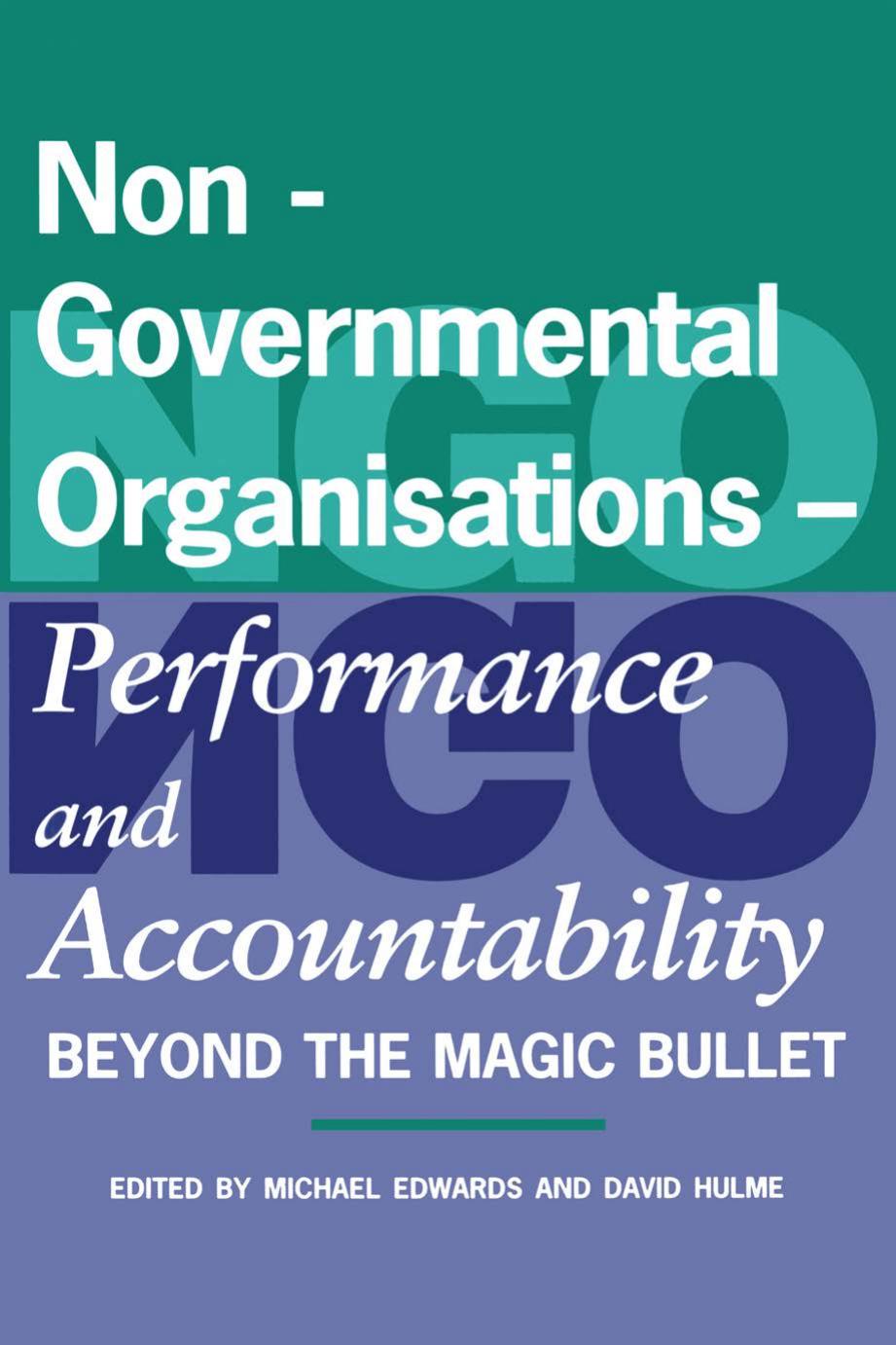Non Governmental Organisations Performance and Accountability 1st Edition by David Hulme, Michael Edwards ISBN 1134171730 9781134171736
$70.00 Original price was: $70.00.$35.00Current price is: $35.00.
Instant download Non Governmental Organisations Performance & Accountability Beyond the Magic Bullet by Edwards (1st edition) after payment
Non Governmental Organisations Performance and Accountability 1st Edition by David Hulme, Michael Edwards – Ebook PDF Instant Download/Delivery: 1134171730, 9781134171736
Full dowload Non Governmental Organisations Performance and Accountability 1st Edition after payment

Product details:
ISBN 10: 1134171730
ISBN 13: 9781134171736
Author: David Hulme, Michael Edwards
The last decade has seen some significant changes in international development and in the status of non-governmental organisations operating in the field. Not only has the number of NGOs virtually doubled; many of them have seen a considerable growth in their budgets, and have grown closer to governments and official aid agencies. NGOs are acknowledged by many to be more effective agents of development than governments or commercial interests ? even as a ?magic bullet? for development problems. Despite these positive trends, the real impact of the NGO sector is not well documented. This is partly because NGO performance-assessment and accountability methods are weak, and partly because NGOs are caught up increasingly in the world of official aid, which pushes them towards certain forms of evaluation at the expense of others. This unique book takes a hard and critical look at these issues, and describes how NGOs can, and must, improve the way they measure and account for their performance if they are to be truly effective.
Non Governmental Organisations Performance and Accountability 1st Table of contents:
Part I Conceptual Frameworks
1 NGO Performance and Accountability: Introduction and Overview
NGO performance
NGO accountability
The structure of this book
Notes
2 Why NGOs are not a Third Sector: a Sectoral Analysis with Some Thoughts on Accountability, Sustainability and Evaluation
Some sceptical and affirmative thoughts on accountability
Evaluation as a possible deterrent to sustainability: the importance of externalities
The importance of concepts and ways of thinking
Notes
3 Negotiating Room for Manoeuvre: Reflections Concerning NGO Autonomy and Accountability Within the New Policy Agenda
Linear approaches to development and room for manoeuvre
The case for a greater role for NGOs: questioning current orthodoxies
NGO comparative advantage
The hour of the ‘third generation’ NGO
NGOs and civil society
NGOs as innovators
A duty to scale-up?
Ways forward
Questioning the withdrawal of government
The intractable nature of autonomy and accountability
Conclusion
Notes
4 ‘Board Games’: Governance and Accountability in NGOs
NGO governance
Forms of governance
1 Family boards
2 Invisible boards
3 Staff boards
4 Professional boards
Other issues
Linkages to accountability
Future challenges
Part II Case Studies
5 Scaling-up, Mainstreaming and Accountability: the Challenge for NGOs
1 The BINGO option
2 Multipliers
3 Planned diffusion of NGO alternatives
4 Multi-actor programming: widening the horizon
5 Mainstreaming
6 Scaling-up, mainstreaming and accountability
Notes
6 European NGOs and Democratisation in Central America: Assessing Performance in the Light of Changing Priorities
Conclusions
Notes
7 From Accountability to Shared Responsibility: NGO Evaluation in Latin America
Conclusions
Note
8 Accountability and Participation: a Case Study from Bombay
The problem of accountability
Apnalaya: the organisation and its work
Activities and mechanisms for functional accountability
Community development
Strategic accountability
An assessment of the accountability system in Apnalaya
Principle and practice
Determining longer-term impact
Taking a strategic view and accounting ‘downwards’
Negative implications of the New Policy Agenda
The sustainability problem
New directions
Strategic change
Notes
9 Strategies for Monitoring and Accountability: the Working Women’s Forum Model
Conclusion
Note
10 NGO Accountability in Bangladesh: Beneficiaries, Donors and the State
Conclusion
11 NGOs in Bangladesh: Issues of Legitimacy and Accountability
Conclusion
Notes
12 ‘Return to the Roots’: Processes of Legitimacy in Sudanese Migrant Associations1
Conclusion
Notes
13 NGOs and Development in East Africa: a View from Below1
Conclusion
Notes
Part III Ways Forward
14 Assessing NGO Performance: Difficulties, Dilemmas and a Way Ahead
1 Introduction
2 Factors affecting the assessment of project performance
Development as a linear process
Development as complex, contingent change
3 Assessing NGO organisational performance
A ‘bottom line’ for non-profit organisations
The bottom line for development NGOs
4 A way ahead in NGO performance assessment
A unifying principle: engaging multiple stakeholders structurally and systematically
The importance of process
NGO performance assessment as combined social judgement
Uniting the strands: performance as an expression of organisational capacities
Easing management tensions: linking performance and accountability
5 Speculative conclusions
Notes
15 Painting Canadian Roses Red
Canada: Evaluation off the rails?
Hard choices in hard times
Institutional funding
How to evaluate a Canadian NGO
Funding criteria
Conclusion
Notes
16 Accountability and Effectiveness in NGO Policy Alliances1
The concepts: effectiveness and accountability
Effectiveness of policy alliances
Accountability in policy alliances
The cases
The Philippine campaigns
The transnational campaigns
Analysis of alliance effectiveness
Policy outcomes
Impact on civil society
Seeking impact on both policy and civil society
Characteristics of alliance effectiveness
Analysis of alliance accountability
Factors affecting alliance accountability
Conclusion
Notes
17 Participatory Methods for Increasing NGO Accountability: a Case Study from India
Accountability: multiple dimensions
Participatory methods to increase accountability
The Aga Khan Rural Support Programme, India (AKRSP)
The development of performance criteria for AKRSP through evaluation workshops
Ranking AKRSP as a support organisation based on the agreed performance criteria
Institutional (Venn) diagramming to assess the comparative performance of AKRSP vis-à-vis other development institutions in the area
Evaluation workshops to discuss the results of the ranking exercises and steps for corrective action
Participation of Vis in strategic planning exercises prior to external evaluation
Development of local monitoring and Management Information Systems (MIS)
Participation of VI office-bearers in the recruitment of NGO staff, training and performance appraisal
Problems encountered
Implications for practice and policy
18 Transforming the Transnational NGOs: Social Auditing or Bust?
Looking back from 2010: forced shifts in accountability
Context
Seeking ways forward
Accountability and ownership
Forms of TNGO accountability
Forms of TNGO accountability
The ‘NICs’: accountability and organisation
Conclusions and lessons
Looking forward from now: a practical approach to accountability
Context
Seeking ways forward
Social auditing
Key stages of the social audit process
Accountability and effectiveness
Conclusions and lessons
19 The Primacy of the Personal1
‘Discovering’ behaviour and attitudes
Normal North-South dominance
Contemporary change in NGOs
The primacy of the personal
Homeostasis
Reasons for neglect
An agenda for personal action
An agenda for experiential learning
Notes
20 Beyond the Magic Bullet? Lessons and Conclusions
1 The influence of the New Policy Agenda – real or imagined?
2 The importance of negotiation
3 The ‘baby and the bathwater’
4 Accounting for what?
5 The management of accountability
People also search for Non Governmental Organisations Performance and Accountability 1st:
non governmental organisations performance
non profit organization performance evaluation
non-governmental organizations operate
non-governmental organizations examples
non-governmental organizations (ngos)


